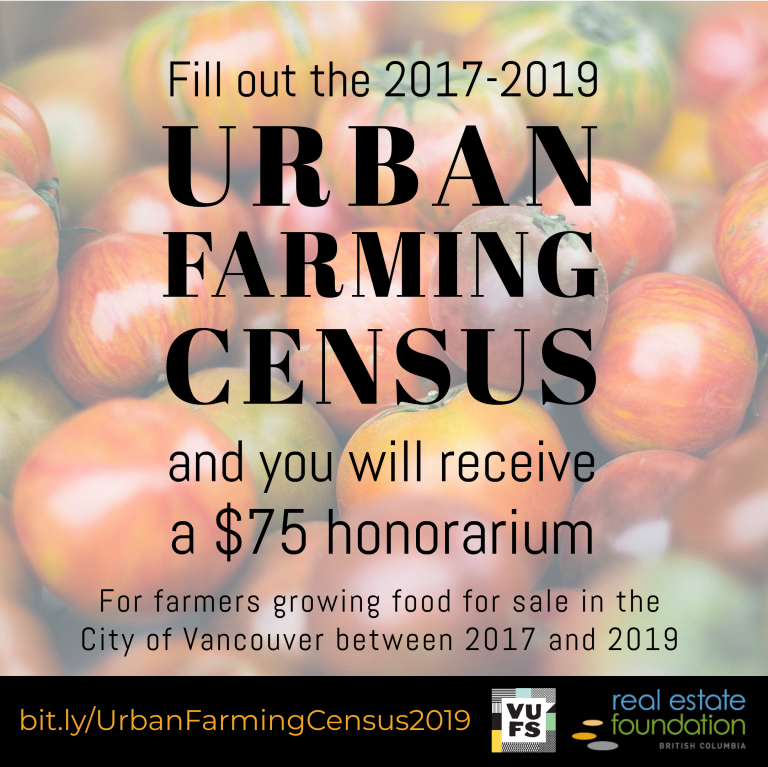Read the Urban Farming Census 2017-2019
Here we present the Vancouver Urban Farming Census 2017 to 2019. The Census, made possible with funding from the Real Estate Foundation of BC, builds upon two previous censuses, to provide ten years of continuous data on the characteristics and impact of urban farms in Vancouver.
Excerpt from the Executive Summary:
“When the previous Census was released in 2016, the report showed an increase in production, but slowing of growth in how much land was being farmed in the city. Urban farms faced economic challenges to their operations from low returns, high labour costs, insecure land tenure, and restrictive regulations. The report concluded that the City was unlikely to meet its target of 35 urban farms by 2020 without providing tangible support and resources to the sector.”
“Those conclusions hold true 3 years later. The results of the 2017-2019 Vancouver Urban Farming Census show that revenues from farm sales overall declined by 37% between 2016 and 2019. There are fewer active urban farms, and a number of farms have either left the City or closed down their operations. At the same time, urban farmers are resilient, determined, and driven by values to make the food system more just and sustainable. Urban farms that remain in the city are showing growth in terms of land area under production. They continue to provide opportunities for city residents to connect with the food system and with each other, while demonstrating what it means to grow food using ecological methods.”
Download the Vancouver Urban Farming Census 2017-2019 (14 MB) >>
Fill out the Urban Farming Census
We invite all urban farmers in the City of Vancouver to participate in the Urban Farming Census. If you grew and sold food, flowers, mushrooms, or animal products (eggs/honey) in the City of Vancouver between 2017 and 2019, the Census is for you. We will compensate your time with a $75 honorarium.
Two ways to fill out the Census:
- Download it as a fillable Word document and send the completed form to the email address specified.
- Fill it out as a Google Form.
We hope to have all the data collected by the end of December in order to present the results at the Urban Farming Form on January 20th. As you may be aware, the City of Vancouver is in the process of evaluating the impacts of the Urban Farm Guidelines developed in 2016. The Census is well-timed for gathering data that will help in advocating for more supporting policies for urban farms.
This version builds on the previous two Censuses covering 2010-2013 and 2014-2016. We have added more questions about the social and community impacts of urban farming, as well as questions to gather your feedback and ideas on municipal policies to support your work. We are also hoping to reach urban farms that grow other products besides fruits and vegetables, such as mushrooms, flowers, eggs, honey, etc.
Read the Urban Farming Census 2014-2016
We are pleased to announce the release of the Vancouver Urban Farming Census 2014 to 2016. The Census, funded by the City of Vancouver, builds upon Marc Schutzbank’s thesis work conducting census surveys in 2010 to 2013 to provide seven years of data on the characteristics and impact of urban farms in Vancouver.
In the Census, you’ll find information on the number of farms operating in the City of Vancouver, the amount of land under production, farm job creation and volunteer labour, food sales, community engagement, challenges to operating an urban farm business, and the contribution of urban farms to the Vancouver Food Strategy goals.
Download the Vancouver Urban Farming Census 2014-2016 >>
Census highlights:
-
- 13 self-identified urban farm operations in the City of Vancouver
-
- 7 acres of urban land under food production
-
- $750,000 in food sales in 2016
-
- 35 FTE jobs created by urban farms in 2016
-
-
- 15,000 residents involved in farming and food activities on just 4 farms
- 0 complaints from Vancouver residents about negative impacts of urban farms
-

Follow Us